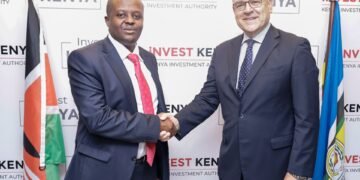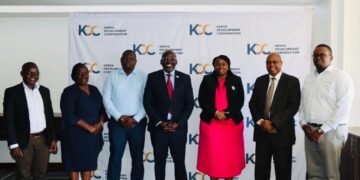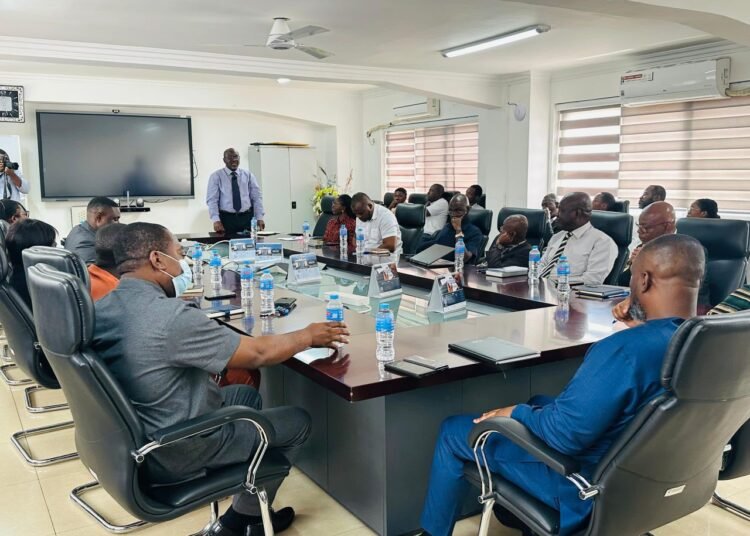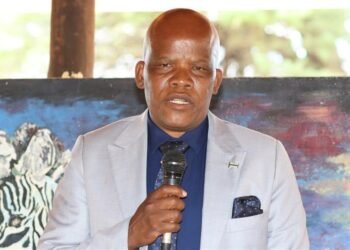The Minister for Works, Housing, and Water Resources, Mr. Kenneth Gilbert Adjei, has commended Ghana Water Limited (GWL) for its efforts in expanding urban water supply and improving service delivery across the country.
During a working visit to the GWL Head Office in Accra, Mr. Adjei reaffirmed the Government’s commitment to ensuring universal access to potable water. He engaged with the company’s management, led by Managing Director Mr. Adam Mutawakilu, to assess ongoing operations, challenges, and strategic initiatives aimed at enhancing urban water distribution.
Speaking during the visit, Mr. Adjei emphasized the Government’s dedication to providing the necessary resources and policy support to ensure GWL’s success in its mandate.
“Access to clean water is a fundamental right, and we will work closely with stakeholders to improve infrastructure, address operational challenges, and enhance service delivery,” he stated.
The Minister highlighted water sector development as a national priority, stressing the importance of funding infrastructure projects to expand water supply networks. He acknowledged GWL’s crucial role in urban water provision and pledged support to enhance its operational efficiency.
He also noted the Government’s determination to tackle issues such as Non-Revenue Water (NRW) losses, infrastructure rehabilitation, and sustainable water management, adding that strategic investments would be made to address these challenges.

Providing an overview of the company’s governance and operations, Mr. Mutawakilu outlined GWL’s structured approach to ensuring efficiency and accountability. The company, he said, operates under a Board of Directors and comprises multiple divisions, including Water Treatment and Quality Management, Finance and Accounting, Business Development, and Regional Operations covering 15 operational regions.
GWL currently oversees 92 water systems, serving an estimated 17 million people, with a strategic focus on improving service delivery, enhancing efficiency, and ensuring financial sustainability.
As part of its efforts to improve urban water supply, GWL has embarked on several major projects. Mr. Mutawakilu cited the expansion of transmission lines from Kpong to Tema to strengthen primary transmission networks and enhance supply reliability.
READ ALSO: NIGERIA: MINIMUM WAGE:STATE PERSONNEL COSTS SURGE FROM N2TN TO N3.8TN
In infrastructure rehabilitation, the company has undertaken the replacement of aging pumps, installation of Automatic Voltage Regulators (AVRs), and dredging of water intake points at Sekyere Hemang, Owabi, Winneba, and Nsawam.
Mr. Mutawakilu identified Non-Revenue Water (NRW) as a significant challenge, with substantial water losses occurring due to leaks, theft, and metering inaccuracies. These losses, he noted, impact the company’s revenue and ability to reinvest in system improvements.
To combat NRW, GWL is implementing several initiatives, including upgrading metering systems to improve accuracy, reducing billing errors, and utilizing technology such as drones and GIS mapping to detect and repair leaks promptly. The company also aims to reduce NRW by one to two percent annually.

Further strategies include scaling up e-business solutions, such as electronic payments and digital monitoring, as well as strengthening collaborations with government agencies to prevent water source pollution.
To address maintenance challenges related to water treatment plants, pumps, and distribution pipelines, Mr. Mutawakilu disclosed that GWL is making targeted investments through a Performance Improvement Programme (PIP) to minimize downtime and improve efficiency.
In response, Mr. Adjei reiterated the Government’s readiness to support these strategies, emphasizing the prioritization of water accessibility as part of a broader infrastructure development agenda.
He assured that the Ministry would collaborate closely with GWL to meet the growing demand for urban water supply while ensuring affordability and sustainability.






























































